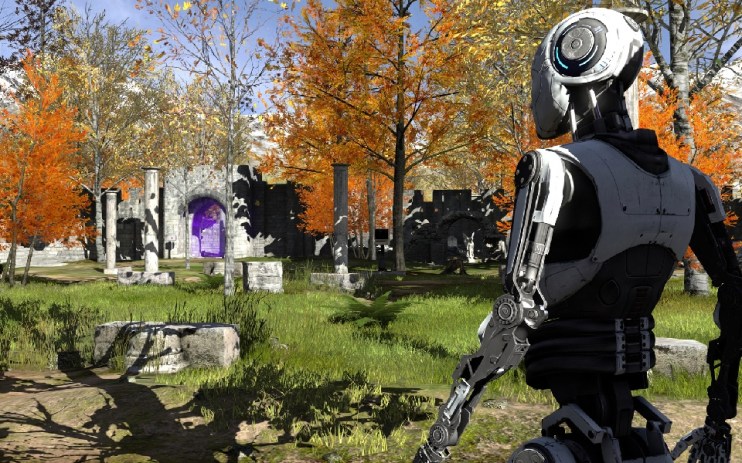The Talos Principle 2 review: A fascinating ode to enlightenment

It has been almost a decade since the release of The Talos Principle, a strange, beautiful, often inscrutable game that used puzzles involving blocks and pressure plates to explore the fundamental questions of western philosophy.
In this sequel you once again take control of a humanoid robot struggling to come to terms with the nature of existence. Set hundreds of years after the events of the first game, you awaken into a 1,000-strong society of robots living in a remote colony that represents the sole successors to the long-extinct human race.
Within minutes of being “born” you’re grappling with weighty topics including the relative benefits of individualism vs collectivism, and what it means to be the progeny of a species that destroyed the world through greed and stupidity.
You’re soon whisked away from the safety of the New Jerusalem colony to a series of mysterious islands littered with impossible technology and byzantine puzzles. In their most basic form these involve entering a chamber and manipulating beams of light in order to open doors. As you progress through the game’s many, many puzzles, more elements and moving parts are introduced, increasing the difficulty exponentially.
Soon your potential puzzle-solving arsenal is expanded to include a Portal-style “drill” that can open a hole in a certain type of wall, replica bodies that you can swap between to access new areas, and a gravity manipulation tool that shifts the whole perspective of that chamber.
The puzzles are ingenious, hitting that sweet spot where they seem, at first, to be impossible, before you get that eureka moment when it all suddenly clicks into place, making you feel like the smartest post-apocalyptic android who ever lived. Even after dozens of these functionally-similar problems I was always ready for ‘just one more’.
It’s all strung together by a beautiful and varied world – one moment green pastures, the next icy mountains – filled with secrets to discover. Indeed, many of the game’s problems hide where you don’t expect them, scattered across the elegiac landscapes between chambers, many requiring you to “break” the self-contained puzzles in order to use their resources in the wider world.
The wistful, remote atmosphere from the original Talos Principle remains – a robot is born alone and dies alone, after all – but it’s broken up by other post-humans who join you on your expedition, allowing more of a dialectical approach to philosophising.
Your new robot brethren follow a strict code – almost a religion – passed down from the scientists who programmed them: that they would live in harmony with nature and never expand beyond 1,000 members, you being the final one.
As the title suggests (Talos was a giant bronze man built by the Greek god of invention), this is a game obsessed with mythology and you can spot allusions to ancient Greece and Egypt everywhere you look, from the crumbling ruins all around to the cryptic notes left on terminals hidden around the world. The scope of this ode to enlightenment also reaches further, from the Garden of Eden to the French Revolution, from the poet Byron to René Descartes.
It’s a fascinating tapestry, and while the philosophising can be a little on the nose – especially the conversations with your fellow robots, each of whom exist primarily as an archetype to challenge your ontological assumptions – there’s something refreshing about a game that’s so unashamedly, robustly academic. The first Talos Principle holds a special place in my heart and this is more of the same good stuff.
